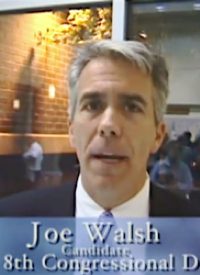
On two separate occasions, the League of Women Voters has refused to allow a debate audience to recite the Pledge of Allegiance, forcing the crowds to break out into a spontaneous recitation. The first incident took place last week in Illinois, while the second happened on Tuesday, October 26, in Pittsburgh, Pennsylvania.
In Illinois prior to the start of the debate led by the League of Women Voters in the Illinois 8th Congressional District between Tea Party favorite Joe Walsh and Melissa Bean, an audience member asked whether or not they would be reciting the Pledge of Allegiance. As the moderator began to explain that they would not in fact be saying the Pledge, the crowd overruled her decision and began reciting it. Footage reveals Joe Walsh joining in with the crowd:
{modulepos inner_text_ad}
Web footage of the Illinois incident appeared on Monday night’s episode of Fox News’ Glenn Beck, prompting Beck to compare the League of Women Voters to liberal groups such as ACORN and the Tides Foundation: “The League of Women Voters? Oh really? I’ll add them to my list of people I don’t trust anymore,” he remarked.
The Blaze reports on the second occurrence: “As a debate between Democrat congressional hopeful Dan Connolly and Republican incumbent Rep. Tim Murphy [of Pennsylvania’s 18th District] was about to begin, Murphy asked the moderator if they could say the Pledge. The moderator hesitated, and began explaining that starting with the Pledge is not the usual way to begin and that it would take too much time. The crowd ignored her explanation, stood up, and recited their allegiance.”
Immediately following the spontaneous outburst, moderator Susan Ruether, listed on the local Washington County LWV website as a committee member in charge of media communications, reprimanded the crowd for its outburst. She also scolded Murphy for initiating the request, advising him, “Next time if you have a request like that, we would appreciate it if you would give it to us when the rules are discussed.”
Murphy responded, “It didn’t need to be requested. I assumed you would do it.”
League of Women Voters President, Arlene Levy, claims that the requests to recite the pledge were merely political and intentionally disturbing. “There have been some groups who want to create a ruckus, call attention to something and using the pledge to the flag and making it seem the League is unpatriotic if we don’t,” she remarked.
Levy explained that the pledge is recited only upon request from one of the forum’s hosts. She added that the LWV adheres strictly to the agenda set prior to an event in order to stay on schedule.
Both Murphy and Connolly appeared surprised by the moderator’s opposition to the Pledge. Connolly explained, “I see it [the Pledge] as something completely apolitical. It’s something that unites all of Americans.”
Murphy added, “If the flag is political, then we have some problems here. The flag is what brings us together.”
Crowd members were equally disturbed by Levy’s response. Tom Hajzus, a former high school principal, registered Democrat, and Murphy supporter, stated, “The insensitivity [of the moderator], to me, was inexcusable and outrageous.” Hajzus sat in the front row of the auditorium with a 22-year-old Marine veteran wounded by a bomb in Afghanistan.
However, Hajzus was proud of the crowd’s response — a moment he dubbed “American.”
Likewise, Murphy pointed out, “It was inspiring to see the whole audience doing that. That was a good, heartwarming moment. With all the divisiveness in the country, it was good to see people united.”
According to The Blaze, following the second incident, “Levy told KDKA-TV that the Greater Pittsburgh LWV is considering now incorporating the Pledge into every candidate debate.”
The Post Gazette writes, “Political fights over the Pledge of Allegiance, which was officially adopted in 1942, are not new, most prominently when the phrase ‘under God’ was added in 1954.”
During the 1988 presidential campaign, for example, then Republican candidate George Bush, Sr. criticized his opponent, Massachusetts governor Michael Dukakis, for vetoing a bill to fine teachers who did not lead the classes in the Pledge of Allegiance, asserting it was an unconstitutional bill.
Bush questioned, “What is it about the Pledge of Allegiance that upsets him so much?”
Evidently, in light of the recent incidents involving the Leage of Women Voters, Dukakis is not the only individual who views the Pledge of Allegiance as controversial.




